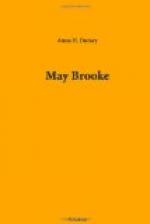Who would measure the patriotism and purity of Washington, by the treason of Arnold? Dare not then, be guilty of the manifest injustice of judging the Church by the conduct of those, who, although bearing her sign on their foreheads, become traitors to her holy precepts, and scandalize her in their lives.
CHAPTER XV.
THE DISCOVERY.
The old man was far down in the shadow of the mountain; the day was well-nigh spent, when, by the grace of God, he fled into the fold of Faith for safety; and now, when all was over, the Church, like a loving mother, more tender of the repentant prodigal, who had fallen at her feet, and died, than of those who had never sullied, or torn their robes, and squandered their substance in the world’s wild wilderness, poured out the riches of its solemnities around the altar, where the Divine Sacrifice was offered, with touching prayers, for his eternal repose.
Father Fabian officiated, and spoke eloquently of the nothingness of the world, the uncertainty of life, and the emptiness of riches. The cathedral was crowded by persons whom the news of Mr. Stillinghast’s conversion had brought together, and who, regarding it as an extraordinary event, were desirous of witnessing the funeral ceremonies, and at the same time testify their respect for his memory. The most influential and wealthy of the class to which he belonged were present, and habituated as they were to look at every thing in a commercial point of view, their general opinion was that their old companion in trade had made a good bargain. “He was stern and harsh,” they said, “but honest and upright; and too shrewd altogether to make a bad speculation in the end, and doubtless he had sought only his best interests in the step he had taken.”




